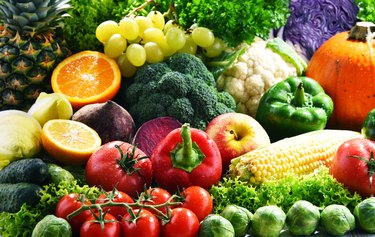
High cholesterol — especially the "bad" LDL, or low-density lipoprotein type — is a major risk factor for heart disease, and it's a problem for many Americans. While much of your cholesterol is determined by heredity and age, diet can play a key role. But how quickly can changes in your diet help?
Video of the Day
Video of the Day
Understanding Cholesterol
Cholesterol circulates in your bloodstream, carried in packages called lipoproteins, explains the National Heart, Lung, and Blood Institute.
Your body needs cholesterol for such tasks as making hormones and building cells, says Harvard Health Publishing. Most of your cholesterol is in the LDL form, which carries cholesterol to the arteries, where it can build up as plaque, narrowing blood vessels and making them less flexible, per Harvard Health. High-density lipoprotein cholesterol, or HDL, on the other hand, helps remove cholesterol from your body.
The takeaway is this, according to the National Institutes of Health (NIH): The higher your LDL level and the lower your HDL level, the greater your risk for heart disease. According to the Centers for Disease Control and Prevention (CDC), total cholesterol numbers above 240 and HDL levels under 40 raise your risk for heart disease.
The 'TLC' Option
One of the diets that the NIH recommends to help lower LDL levels is its Therapeutic Lifestyle Changes, or "TLC" program. Along with exercising and losing weight if you're overweight, the TLC program calls for reducing your consumption of saturated fat to less than 7 percent of your daily calories and total fat to no more than 35 percent, and increasing your consumption of high-fiber foods like whole grains, fruits, vegetable and legumes.
Eating a diet rich in fruits and vegetables can increase cholesterol-lowering compounds, called plant stanols or sterols. says NIH.
Say you're watching what you eat, cutting out saturated fats and consuming more fruit and vegetables. How long will it take to see a difference in your cholesterol levels? The good news is that it can be fast.
"Within two weeks, LDL levels can decrease if you decrease your calories and saturated fat," says Penny Kris-Etherton, PhD, a professor of nutrition at Penn State's College of Health and Human Development in University Park, Pennsylvania. But, she warns, "if you revert to the same old diet, your LDL will go back up."
Qi Sun, MD, an associate professor in the nutrition department at Harvard's T.H. Chan School of Public Health in Boston, is a little more conservative, but agrees that cholesterol levels can improve very quickly. "A couple of months can make a big difference, especially in LDL levels," he says.
Factors to Consider
The impact of diet on cholesterol levels "can be a lot," says Dr. Sun. He cites saturated fats and trans fats as the biggest factors in raising LDL cholesterol. And, he adds, losing weight may not be enough to lower cholesterol. "It's not only how many calories you consume, but how much saturated fat is in your diet," says Dr. Sun. "If you eat 100 or 200 fewer calories a day but increase saturated fat, you'll still raise your LDL levels."
For many people, the amount of cholesterol contained in the food they eat has only a modest effect on their blood cholesterol levels, according to Harvard's T.H. Chan School of Public Health. But for people who are genetically predisposed, cholesterol-rich foods have a big impact, and foods like organ meats, egg yolks, shrimp and whole-milk dairy products should be limited.
High cholesterol usually has no signs or symptoms and you might not know your levels are too high until you have a heart attack or stroke, the CDC says. Experts recommend getting your cholesterol levels checked at least every four to six years. If your parents or immediate family members have high cholesterol, you could have a condition called familial hypercholesterolemia and may need to be tested more often.
- Centers for Disease Control and Prevention: “Total and High-density Lipoprotein Cholesterol in Adults: United States, 2015–2016”
- National Institutes of Health, U.S. National Library of Medicine: “How to Lower Cholesterol With Diet”
- Harvard T.H. Chan School of Public Health: “The Nutrition Source: Cholesterol”
- Centers for Disease Control and Prevention: “Cholesterol Myths and Facts”
- Qi Sun, MD, associate professor, Harvard T.H. Chan School of Public Health, Boston
- Penny Kris-Etherton, PhD, professor, nutrition, Penn State College of Health and Human Development, University Park, Pennsylvania
- National Heart, Lung, and Blood Institute: "Blood Cholesterol"
- Harvard Health Publishing: "How It’s Made: Cholesterol Production in Your Body"
Is this an emergency? If you are experiencing serious medical symptoms, please see the National Library of Medicine’s list of signs you need emergency medical attention or call 911.